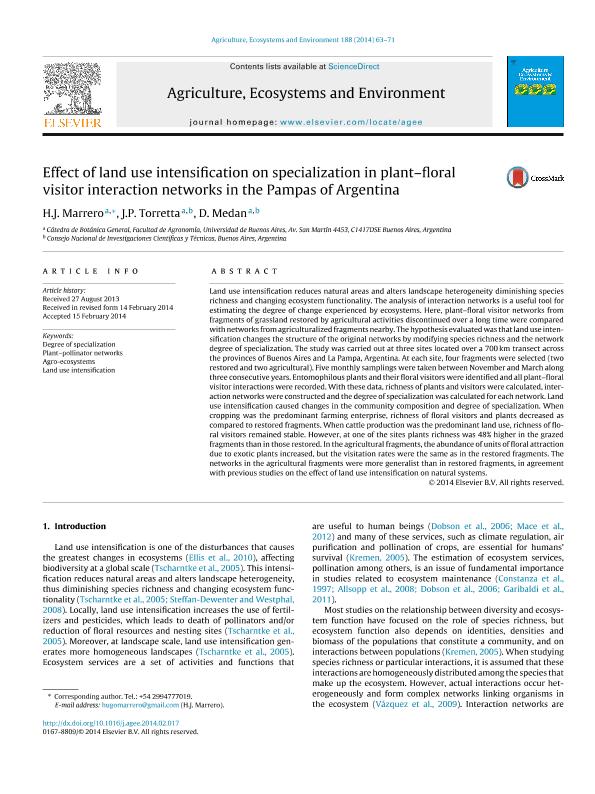Mostrar el registro sencillo del ítem
dc.contributor.author
Marrero, Hugo Javier

dc.contributor.author
Torretta, Juan Pablo

dc.contributor.author
Medan, Diego

dc.date.available
2017-05-18T21:51:09Z
dc.date.issued
2014-04
dc.identifier.citation
Marrero, Hugo Javier; Torretta, Juan Pablo; Medan, Diego; Effect of land use intensification on specialization in plant–floral visitor interaction networks in the Pampas of Argentina; Elsevier Science; Agriculture, Ecosystems And Environment; 188; 4-2014; 63-71
dc.identifier.issn
0167-8809
dc.identifier.uri
http://hdl.handle.net/11336/16704
dc.description.abstract
Land use intensification reduces natural areas and alters landscape heterogeneity diminishing species richness and changing ecosystem functionality. The analysis of interaction networks is a useful tool for estimating the degree of change experienced by ecosystems. Here, plant–floral visitor networks from fragments of grassland restored by agricultural activities discontinued over a long time were compared with networks from agriculturalized fragments nearby. The hypothesis evaluated was that land use intensification changes the structure of the original networks by modifying species richness and the network degree of specialization. The study was carried out at three sites located over a 700 km transect across the provinces of Buenos Aires and La Pampa, Argentina. At each site, four fragments were selected (two restored and two agricultural). Five monthly samplings were taken between November and March along three consecutive years. Entomophilous plants and their floral visitors were identified and all plant–floral visitor interactions were recorded. With these data, richness of plants and visitors were calculated, interaction networks were constructed and the degree of specialization was calculated for each network. Land use intensification caused changes in the community composition and degree of specialization. When cropping was the predominant farming enterprise, richness of floral visitors and plants decreased as compared to restored fragments. When cattle production was the predominant land use, richness of floral visitors remained stable. However, at one of the sites plants richness was 48% higher in the grazed fragments than in those restored. In the agricultural fragments, the abundance of units of floral attraction due to exotic plants increased, but the visitation rates were the same as in the restored fragments. The networks in the agricultural fragments were more generalist than in restored fragments, in agreement with previous studies on the effect of land use intensification on natural systems.
dc.format
application/pdf
dc.language.iso
eng
dc.publisher
Elsevier Science

dc.rights
info:eu-repo/semantics/openAccess
dc.rights.uri
https://creativecommons.org/licenses/by-nc-nd/2.5/ar/
dc.subject
Degree of Specialization
dc.subject
Plant–Pollinator Networks
dc.subject
Agro-Ecosystems
dc.subject
Land Use Intensification
dc.subject.classification
Ecología

dc.subject.classification
Ciencias Biológicas

dc.subject.classification
CIENCIAS NATURALES Y EXACTAS

dc.title
Effect of land use intensification on specialization in plant–floral visitor interaction networks in the Pampas of Argentina
dc.type
info:eu-repo/semantics/article
dc.type
info:ar-repo/semantics/artículo
dc.type
info:eu-repo/semantics/publishedVersion
dc.date.updated
2017-05-18T21:18:47Z
dc.journal.volume
188
dc.journal.pagination
63-71
dc.journal.pais
Países Bajos

dc.journal.ciudad
Amsterdam
dc.description.fil
Fil: Marrero, Hugo Javier. Universidad de Buenos Aires. Facultad de Agronomia. Cátedra de Botanica General; Argentina. Consejo Nacional de Investigaciones Científicas y Técnicas; Argentina
dc.description.fil
Fil: Torretta, Juan Pablo. Universidad de Buenos Aires. Facultad de Agronomia. Cátedra de Botanica General; Argentina. Consejo Nacional de Investigaciones Científicas y Técnicas; Argentina
dc.description.fil
Fil: Medan, Diego. Universidad de Buenos Aires. Facultad de Agronomia. Cátedra de Botanica General; Argentina. Consejo Nacional de Investigaciones Científicas y Técnicas; Argentina
dc.journal.title
Agriculture, Ecosystems And Environment

dc.relation.alternativeid
info:eu-repo/semantics/altIdentifier/doi/http://dx.doi.org/10.1016/j.agee.2014.02.017
dc.relation.alternativeid
info:eu-repo/semantics/altIdentifier/url/http://www.sciencedirect.com/science/article/pii/S0167880914000978
Archivos asociados
